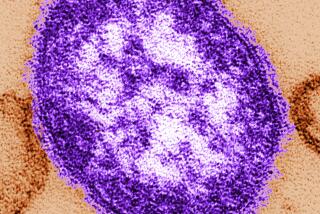Travelers into U.S. feel increased security measures
- Share via
Some international travelers faced increased scrutiny Monday from airport security officials before boarding flights bound for Los Angeles and other destinations in the United States.
Flying from Saudi Arabia, a UC Irvine student and his father, both Bahraini, said they encountered more security than usual at London’s Heathrow Airport, where they passed through metal detectors and, like other passengers, underwent pat-down searches.
Then, after arriving at Los Angeles International, they were questioned by authorities as they claimed their luggage at the Tom Bradley terminal, and officials searched a book bag the student was carrying. The passengers, who spoke on the condition that they not be identified for fear of being harassed, said authorities wanted to know why they were in the U.S. and where they lived.
“I had seen the news and I knew it would be rough,” said the student, 18. “They took my bag and took everything out, just right there in front of everyone. It feels bad. It’s supposed to be everybody or nobody. It’s not right.”
Such is the state of international air travel after an attempt to bomb a Northwest Airlines flight on Christmas.
Like the student and his father, airline passengers bound for the United States from other countries will face additional screening, and all travelers from 14 nations linked to terrorism will be subject to pat-down searches and physical inspections of their carry-on items under a federal directive that went into effect Monday.
The more stringent pat-down policy and screening of carry-ons affect passengers on flights coming from Cuba, Iran, Sudan and Syria -- nations on the U.S. State Department’s “State Sponsors of Terrorism” list. They also apply to all travelers from other “countries of interest” to the U.S. Department of Homeland Security: Afghanistan, Algeria, Iraq, Lebanon, Libya, Saudi Arabia, Somalia, Nigeria, Pakistan and Yemen.
Immediately after the Northwest incident, the federal government requested that airports around the world and international airlines increase passenger screening, restrict carry-on items and prohibit passengers from leaving their seats in the last hour of flight.
Some of those measures have expired, including limits on passenger movement unless ordered by pilots.
Now, in addition to pat-down searches, international travelers’ carry-on items will be X-rayed and searched by hand at checkpoints.
“By enhancing these security measures for international flights, we are putting into place a sustainable effort that we can continue long term,” said a regional spokesperson for the Transportation Security Administration. “We are telling countries and airlines that want to fly to the United States that they need to do additional screening.”
Security experts said the additional measures would help but that pat-down searches and focusing on travelers from specific countries nevertheless have drawbacks and are no guarantee against a terrorist attack.
“In some respects they are going over ground that was plowed after 9/11 when a lot of attention was focused on Middle Eastern countries,” said Stewart A. Baker, a former assistant secretary for policy at the Department of Homeland Security. “Al Qaeda then began relying on people recruited from other countries. That is the risk.”
Brian Jenkins, a terrorism and security expert at Rand Corp., the Santa Monica-based think tank, said there have been at least 43 reported cases in which Al Qaeda has recruited U.S. citizens or people with legal residency.
Jenkins and Stewart also said pat-down searches are not always effective because terrorists can configure and conceal bombs in ways that only the most intrusive and detailed searches can discover.
Rather than pat downs, Jenkins suggested using chemical tests that can detect traces of explosive materials left on skin. He added that they are more effective and can be performed in about the same amount of time.
Travelers making flights within the U.S. will continue to go through the usual screening at security checkpoints -- a process that requires the removal of shoes and belts as well as limits on liquids and the inspection of all carry-on items, such as cellphones, lap-top computers and luggage.
TSA officials say domestic passengers might experience a second screening as they continue through airport terminals and encounter more law enforcement officials and canine units trained to find explosives.
More to Read
Sign up for The Wild
We’ll help you find the best places to hike, bike and run, as well as the perfect silent spots for meditation and yoga.
You may occasionally receive promotional content from the Los Angeles Times.







